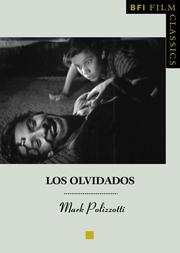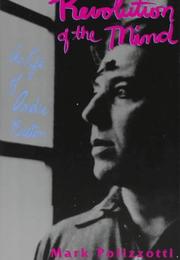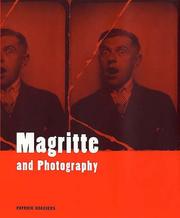| Listing 1 - 10 of 22 | << page >> |
Sort by
|

ISBN: 1844571211 9781844571215 Year: 2006 Volume: 82 Publisher: London British Film Institute
Abstract | Keywords | Export | Availability | Bookmark
 Loading...
Loading...Choose an application
- Reference Manager
- EndNote
- RefWorks (Direct export to RefWorks)
Film --- Buñuel, Luis --- Motion pictures --- City children --- Poverty. --- Hunger. --- Cinéma --- Enfants en milieu urbain --- Pauvreté --- Faim --- Buñuel, Luis, --- Los Olvidados (Motion picture) --- Mexico --- Mexique au cinéma --- In motion pictures. --- Bunuel, Luiz --- Cinéma --- Pauvreté --- Buñuel, Luis, --- Mexique au cinéma
Book
ISBN: 9780262037990 9780262346702 0262346702 9780262346719 0262346710 0262037998 Year: 2018 Publisher: Cambridge, Mass. The MIT Press
Abstract | Keywords | Export | Availability | Bookmark
 Loading...
Loading...Choose an application
- Reference Manager
- EndNote
- RefWorks (Direct export to RefWorks)
This is at once a manual, handbook, and a manifesto on translation in all its literary, business, scientific, machine, and Biblical forms: what some regard as being the "poor cousin of literature" and a "necessary evil"; what others consider to be "the royal road to cross-cultural understanding and literary enrichment." Mark Polizzotti, himself a celebrated translator, avoids the historically entrenched standpoints of "traduttore, traditore" as well as the notion that there is something inherently noble in the practice. Discarding translation theory, Polizzotti instead approaches translation as a practice and looks to sensitize readers--both those informed and those with little knowiedge of the subject--to both the large but also to the more detailed matters at hand by way of concrete examples of translations. The book addresses the history of translation--the "bearing across" of a saint to heaven that it started as in the 12th century in Englsh; it looks at the ethics and culture of translation (and when adaptation can become imperialist appropriation); it draws from personal case studies from the author's own translation work to show the impact that different renderings of a text can have on what the text says; it also looks at the limits of translation, when sounds compete with meaning which in turn competes with cultural context and impossible choices are faced (as in the cases of Surrealist champion Raymond Roussel, or self-described "Schizo" Louis Wolfson, who wrote in French and transmosed any piece of English to hit his ear into phonetic amalgamations of other tongues).
Translating and interpreting --- Interpretation and translation --- Interpreting and translating --- Language and languages --- Literature --- Translation and interpretation --- Translating --- Translation science --- Traduction --- Translators --- Translating and interpreting. --- #KVHA:Vertaalwetenschap --- #KVHA:Vertaler

ISBN: 0306807726 Year: 1997 Publisher: New York (N.Y.) : Da Capo,
Abstract | Keywords | Export | Availability | Bookmark
 Loading...
Loading...Choose an application
- Reference Manager
- EndNote
- RefWorks (Direct export to RefWorks)
Authors, French --- Critics --- Editors --- Surrealism --- Biography.
Book
ISBN: 0747512817 9780747512813 Year: 1995 Publisher: London Bloomsbury
Abstract | Keywords | Export | Availability | Bookmark
 Loading...
Loading...Choose an application
- Reference Manager
- EndNote
- RefWorks (Direct export to RefWorks)
Book
ISBN: 1838713131 1838716947 Year: 2006 Publisher: London : British Film Institute : Bloomsbury Publishing (UK),
Abstract | Keywords | Export | Availability | Bookmark
 Loading...
Loading...Choose an application
- Reference Manager
- EndNote
- RefWorks (Direct export to RefWorks)
Los Olvidados (1950) established Luis Bunuel's reputation as a world-class director. Set in the slums of Mexico City, it follows the crime-filled and violent lives of group of juvenile delinquents. The film exhibits some of Bunuel's recognisable themes of love's yearnings, social injustice, and surrealism, but with a layer of compassion that sets it apart from many of his other films. In 2003, 'Los Olvidados' was inducted into UNESCO's Memory of the World programme, which preserves documentary heritage of world significance. Mark Polizzotti explores the historical context, aesthetic importance and biographical significance of the film, providing the first complete overview of 'Los Olvidados' in English. He also presents an introduction to the Mexican film industry and places Bunuel and his films within it. While many critics have taken 'Los Olvidados' as a film about urban poverty, Mark Polizzotti sees it as a much more personal and mysterious statement about yearning, loss, and the need for redemption. By taking the notion of hunger as its structural principle, he explores the themes of love, betrayal, desire, and death that make the film such a powerful statement more than fifty years after its release.
Film & Media. --- Bunũel, Luis, --- British Film Institute.
Book
ISBN: 9780300257090 0300257090 Year: 2024 Publisher: New Haven Yale University Press
Abstract | Keywords | Export | Availability | Bookmark
 Loading...
Loading...Choose an application
- Reference Manager
- EndNote
- RefWorks (Direct export to RefWorks)
Why does Surrealism continue to fascinate us a century after André Breton?s Manifesto of Surrealism? How do we encounter Surrealism today? Mark Polizzotti vibrantly reframes the Surrealist movement in contemporary terms and offers insight into why it continues to inspire makers and consumers of art, literature, and culture.0 0Polizzotti shows how many forms of popular media can thank Surrealism for their existence, including Monty Python, Theatre of the Absurd, and trends in fashion, film, and literature. While discussing the movement?s iconic figures?including André Breton, Leonora Carrington, Salvador Dalí, René Magritte, Man Ray, and Dorothea Tanning?he also broadens the traditionally French and male-focused narrative, constructing a more diverse and global representation. And he addresses how the Surrealists grappled with ideas that mirror current concerns, including racial and economic injustice, sexual politics, issues of identity, labor unrest, and political activism. Why Surrealism Matters provides a concise, engaging exploration of how, a century later, the ?Surrealist revolution? remains as dynamic as ever.

ISBN: 0853319332 9780853319337 Year: 2005 Publisher: Aldershot Lund Humphries
Abstract | Keywords | Export | Availability | Bookmark
 Loading...
Loading...Choose an application
- Reference Manager
- EndNote
- RefWorks (Direct export to RefWorks)
Fotografie --- Magritte, René --- Photographie --- Painters --- Photography, Artistic --- Surrealism --- Art and photography. --- Art, Belgian --- Peintres --- Photographie artistique --- Surréalisme --- Art et photographie --- Art belge --- Biography. --- Biographies --- Magritte, René, --- Surréalisme --- Magritte, René,
Book
ISBN: 0300213379 9780300213379 9780300198058 0300198051 Year: 2014 Publisher: New Haven, CT : Yale University Press,
Abstract | Keywords | Export | Availability | Bookmark
 Loading...
Loading...Choose an application
- Reference Manager
- EndNote
- RefWorks (Direct export to RefWorks)
A trio of intertwined novellas from the 2014 Nobel laureate for literature In this essential trilogy of novellas by the winner of the 2014 Nobel Prize in Literature, French author Patrick Modiano reaches back in time, opening the corridors of memory and exploring the mysteries to be encountered there. Each novella in the volume--Afterimage, Suspended Sentences, and Flowers of Ruin-represents a sterling example of the author's originality and appeal, while Mark Polizzotti's superb English-language translations capture not only Modiano's distinctive narrative voice but also the matchless grace and spare beauty of his prose. Although originally published separately, Modiano's three novellas form a single, compelling whole, haunted by the same gauzy sense of place and characters. Modiano draws on his own experiences, blended with the real or invented stories of others, to present a dreamlike autobiography that is also the biography of a place. Orphaned children, mysterious parents, forgotten friends, enigmatic strangers-each appears in this three-part love song to a Paris that no longer exists. Shadowed by the dark period of the Nazi Occupation, these novellas reveal Modiano's fascination with the lost, obscure, or mysterious: a young person's confusion over adult behavior; the repercussions of a chance encounter; the search for a missing father; the aftershock of a fatal affair. To read Modiano's trilogy is to enter his world of uncertainties and the almost accidental way in which people find their fates.
Book
ISBN: 0300218915 9780300218916 0300215894 Year: 2015 Publisher: New Haven, CT : Yale University Press,
Abstract | Keywords | Export | Availability | Bookmark
 Loading...
Loading...Choose an application
- Reference Manager
- EndNote
- RefWorks (Direct export to RefWorks)
A classic novel from recent Nobel Prize winner Patrick Modiano, now available to English-language readers in a superb new translation One of the hallmarks of French author Patrick Modiano's writing is a singular ability to revisit particular motifs and episodes, infusing each telling with new detail and emotional nuance. In this evocative novel the internationally acclaimed author takes up one of his most compelling themes: a love affair with a woman who disappears, and a narrator grappling with the mystery of a relationship stopped short. Set in mid-sixties Paris, After the Circus traces the relationship between the narrator, a young man not quite of legal age, and the slightly older, enigmatic woman he first glimpses at a police interrogation. The two lovers make their uncertain way into each other's hearts, but the narrator soon finds himself in the unsettling, ominous presence of others. Who are these people? Are they real, or simply evoked? Part romance, part detective story, this mesmerizing book fully demonstrates Modiano's signature use of atmosphere and suggestion as he investigates the perils and the exhilaration of young love.
Man-woman relationships --- French fiction --- Paris (France) --- 1900 - 1999
Book
ISBN: 0300216726 9780300216721 9780300215335 Year: 2015 Publisher: New Haven, CT : Yale University Press,
Abstract | Keywords | Export | Availability | Bookmark
 Loading...
Loading...Choose an application
- Reference Manager
- EndNote
- RefWorks (Direct export to RefWorks)
Nobel laureate Patrick Modiano has said that his many fictions are all variations of the same story. Pedigree, his memoir, is the theme. In this rare glimpse into the life of Nobel laureate Patrick Modiano, the author takes up his pen to tell his personal story. He addresses his early years-shadowy times in postwar Paris that haunt his memory and have inspired his world-cherished body of fiction. In the spare, absorbing, and sometimes dreamlike prose that translator Mark Polizzotti captures unerringly, Modiano offers a memoir of his first twenty-one years. Termed one of his "finest books" by the Guardian, Pedigree is both a personal exploration and a luminous portrait of a world gone by. Pedigree sheds light on the childhood and adolescence that Modiano explores in Suspended Sentences,Dora Bruder, and other novels. In this work he re-creates the louche, unstable, colorful world of his parents under the German Occupation; his childhood in a household of circus performers and gangsters; and his formative friendship with the writer Raymond Queneau. While acknowledging that memory is never assured, Modiano recalls with painful clarity the most haunting moments of his early life, such as the death of his ten-year-old brother. Pedigree, Modiano's only memoir, is a gift to his readers and a master key to the themes that have inspired his writing life.
Authors, French --- Modiano, Patrick, --- Модиано, Патрик, --- Modiano, Patrik, --- 1900 - 1999 --- Modiano, Patrick
| Listing 1 - 10 of 22 | << page >> |
Sort by
|

 Search
Search Feedback
Feedback About UniCat
About UniCat  Help
Help News
News